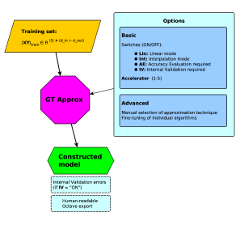Generic Tool for Approximation (GT Approx)
This tool constructs approximations, assesses their quality and performs many other related tasks.
The tool has several unique features:
- It includes a wide range of well-known state-of-the-art approximation techniques (e.g., Splines, Linear Regression, Kriging, etc.) and original techniques developed by pSeven team(e.g., HDA - Higher Dimensional Approximation, SGP - Sparse Gaussian Processes, Tensor Approximation and incomplete Tensor Approximation, Tensor Gaussian Processes etc.). We constantly add new techniques and improve the existing ones based on users' feedback.
- The tool provides SmartSelection™ technology - a built-in decision tree and a hierarchical system of options. The default approximation technique is carefully selected based on our experience gained through extensive testing. But a wide range of options remains available to both expert and non-expert users.

- In addition to constructing approximations, the tool can perform a large number of auxiliary tasks, in particular:
- can theoretically estimate the accuracy of the approximation at a given point using the underlying mathematical model;
- can empirically estimate the overall accuracy of the approximation by automatic cross-validation on the available training data;
- can analytically differentiate the approximation and output its exact Jacobi matrix at any given point;
- can export the constructed approximation to the human-readable matlab/octave format;
- can additionally smooth the approximation before evaluating it at a given point.

Our motto is: you, the user, should interact with the tool in terms of the properties of the approximation that are important and clear to you, not in terms of low-level details of the algorithm that you are unaware of or don't care about.
The tool directly supports several different approximation modes, allowing you to adjust the approximation according to your general needs, in particular:
- you can directly require the approximation to be linear or to exactly fit the training data;
- depending on your problem, you can choose a more crude but also more robust or, conversely, more subtle but also more noise-sensitive approximation;
- the "accelerator" option allows you to speed up the construction of the approximation, at the cost of getting somewhat less accurate result;
- for a multi-component response function, you can choose to construct the approximation jointly for all components, which will preserve similarity between components and speed up the construction process;
- During approximation construction, the tool can process output variances for the target function values if provided, along with points and target function values;
- if the training DoE has a Cartesian factored structure (which is quite common in practice), then a tensored approximation can be constructed, combining different techniques in different factors. This unique feature of pSeven Core is especially useful for highly anisotropic problems.
